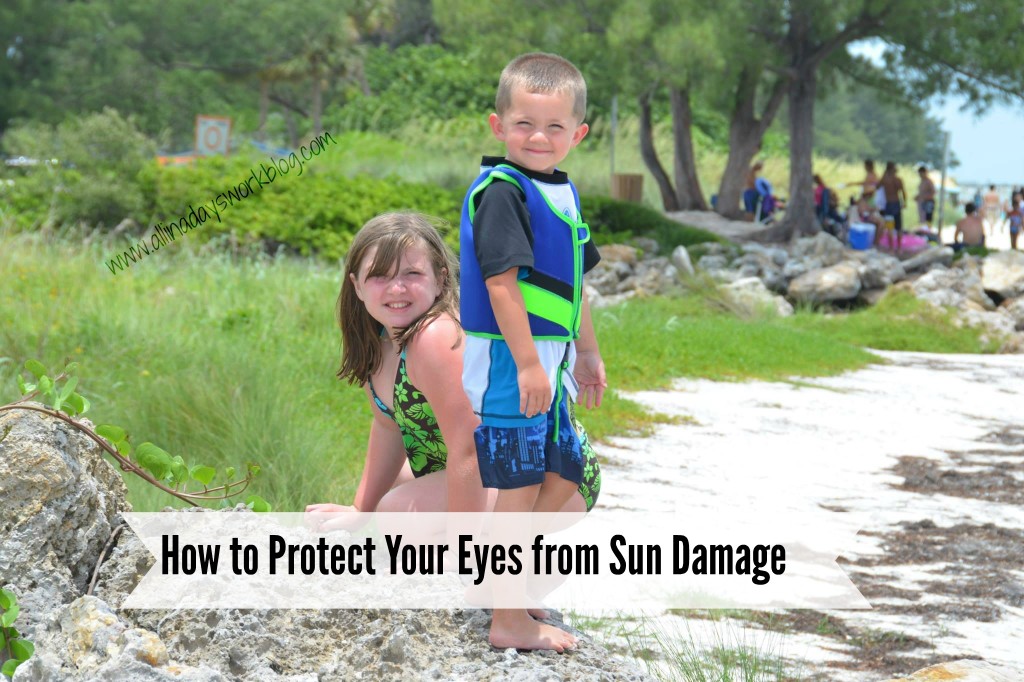I wrote this review while participating in an Influencer campaign by Mom Central Consulting on behalf of Johnson & Johnson Vision Care, Inc. and received a promotional item from Mom Central to thank me for participating.
This summer we are heading out to hit the beaches – North and South. We will be visiting Maine and hitting the coast as well as visiting our favorite spot in Florida- Anna Maria Island. I would say a good 90% of our day (excluding sleeping) will be spent in the water. Before we leave and a few times during the day I lather the kids up with sunscreen. I don’t mind if they get a bit of sun, but we sure don’t want them burnt and being miserable the rest of the trip. We know the importance of sunscreen and how one blistering sunburn in childhood or adolescence can more then double the chances of developing melanoma later in life. We are, after all, doing what we can to protect our children. We make them wear seat belts, take them to the doctor for check-ups, helmets when they are riding bikes and bug spray when we are camping. But until recently, I never gave much thought to protecting their eyes from sun damage.
As I started reading about the facts on the damage of UV rays to eyes, I was shocked. Why wasn’t I told before? Here’s some things I learned:
The Sun & Your Eyes: What You Need to Know
- CUMULATIVE DAMAGE: Experts say it is difficult to isolate the exact amount of damage that Ultraviolet Radiation (UV) imposes on the eye over a long period of time. However, a number of studies have shown that the effects of UV radiation are mostly cumulative and may increase the chance of developing eye problems later in life, including cataracts, a leading cause of reduced vision in the United States.
- IRREVERSIBLE: Short-term damage to the eyes may be hard to notice, but over the long-term, the sun can cause irreversible harm to all structures of the eye and surrounding tissue that are left unprotected or under-protected. These conditions may not manifest for years at which point the damage is already done and it is too late to reverse the effects of the sun. Thats why it is important to start protecting eyes from childhood.
- CHILDREN, TEENS AT GREATER RISK OF EXPOSURE THAN ADULTS: Younger eyes are more susceptible to exposure to the suns harmful rays than adults. Children have larger pupils (allowing more light into their eyes), clearer lenses, and are outside without eye protection much more frequently and for longer periods than most adults. It is estimated that a significant amount of lifetime exposure to UV rays may occur by age 18 and that childrens annual dose of UV radiation is three times that of adults.
- ENVIRONMENTAL FACTORS THAT INFLUENCE UV EXPOSURE – Although direct light from the sun itself can be damaging to eyes, reflected ultraviolet (UV) rays from surfaces such as grass, soil, dry sand, water, and snow can also be harmful. UV protection also is important on a cloudy day as the sun’s rays can pass through thin clouds, exposing your eyes to harmful UV radiation
- SUNGLASSES ALONE SOMETIMES ARE NOT ENOUGH:While most sunglasses can help block UV rays from entering through the lenses, most frame styles do not prevent rays from reaching the eyes from the sides, top, and bottom of the glasses. Hats with brims offer no protection from UV rays reflected up from ground surfaces such as pavement, sand, and water.
- UV BLOCKING CONTACT LENSES can provide an important level of additional protection from UV exposure. Not all contact lenses offer UV protection, and, of those that do, not all provide similar absorption levels. ACUVUE® is the only major brand of contact lenses which blocks approximately 97%of UV-B and 81% of UV-A rays as standard across the entire range of its products.*
- ACHIEVING A COMPREHENSIVE MEASURE OF UV PROTECTION: UV absorbing contact lenses are not substitutes for devices like UV-blocking sunglasses as they do not completely cover the eye or the surrounding area. For more comprehensive UV protection, UV-blocking contact lenses should be worn as an added layer of protection in conjunction with high-quality UV-blocking sunglasses and a wide-brimmed hat.
How to protect your eyes from UV
• The best way to protect your eyes against UV damage is to use a UV filter that will stop most of the harmful rays entering your eyes. Glasses and contact lenses can have built in UV protection.
• All ACUVUE® Brand Contact Lenses have UV blocking filters* embedded into the lens material, which will help protect you throughout the year, not just on the sunny summer days.
• Sunglasses alone will not block all UV rays, as sunlight can still reach the eyes through the sides of the sunglasses. The use of a UV blocking contact lens will give you additional protection.
• Not all sunglasses will have the same level of protection. An effective pair of sunglasses should be able to block out both UVA and UVB rays. While all sunglasses block out UVB radiation, a good pair should also be measured to block out 99% to 100% of UVA rays.
• Pick large lenses that fit close to the eyes. To prevent sunlight reaching through the sides of the sunglasses, use wrap around style glasses.
• Expensive designer sunglasses or polarizing lenses are not necessarily guaranteed to be effective against the harmful rays of the sun.
• Ordinary sunglasses – the kind without certified UVA/UVB protection – can cause more damage to the eyes than not. This is because the dark lenses cause the pupils of the eyes to dilate, letting in more UVA rays that will damage the retina and lens of the eyes.
• Even children need to protect their eyes. Like your skin, most of the sun damage to your eyes is accrued in a person’s early developmental years. So sun protection is vital for young people.
• Sunlight is at its most intense between the hours of 10 in the morning to 2 in the afternoon, which means that ultraviolet exposure to the skin is most dangerous then. However, recent research shows that the eyes are most at risk during mid-morning and the late afternoon so make sure your eyes are well protected all day.
• Reflected light can cause eye burn. At high altitudes, snow-covered mountains, sandy beaches and reflective bodies of water like lakes, rivers and the sea, sun exposure is at its most intense
• Good nutrition can also help protect your eyes. Lutein which is found in foods such as kale, spinach, broccoli and many yellow or orange fruits and vegetables works as an antioxidant for the protection of cells. It helps prevent harmful blue light from reaching – and thus causing damage – to the sensitive back tissue of the retina. Lutein can thus help support the protection offered by UV blocking contact lenses and spectacles.





I wear Acuvue lenses so I’m glad to hear of this protection. I just learned recently that cataracts are caused by exposure to sun.. I never knew that before, and so now I’m going to be much more careful on protecting my eyes.
Love this article. I am always preaching about protecting eyes, young and old, from sun damage. With sensitive eyes I am always wearing sunglasses anyways. The kids love them it’s just the hubs I am trying to get on board!
I’ve never given much thought to protecting my eyes from the sun, but I do wear sunglasses all the time. Thanks for the info!
It’s downright painful near the water without sunglasses and I figure that much discomfort is a sign of no good!
Protecting your eyes from sun damage is not something most people think about until it is too late. Thanks for the great information
Great article. My eyes are so sensitive that I can’t step outside without my sunglasses. Speaking of which, I need new ones. LOL
Love my Acuvue contacts! Been using them for over 10 years now, and adore them! I won’t ever switch!
Thanks so much for these tips. Eye care is so important, especially for kids. I don’t think my contacts have UV protection 🙁
I always slather down with sunscreen – I never really thought about protecting their eyes! Eeeks.
I love large lenses. I don’t love ones that are close to the eyes. I hadn’t thought about that, I wonder if there’s another style out there that accommodates the need and my need for a little room.
It’s odd, but a lot of people don’t give their eyes, outside of sunglasses a second thought when it comes to UV damage. They’re mostly concerned with skin damage, but having lived near the ocean for so long, I became painfully aware, and quickly, of how important serious eye protection is as well, and not just during the summer, but during the winter when the sun reflects off the snow, it’s just as imperative. Great post with so much information!
We have so many sunglasses around the house for everyone it’s ridiculous. But I’d rather ensure the kids eyes are protected then huge medical bills down the road.
I always teach my boys to wear sun glasses to protect their eyes as young as possible!
I wear sunglasses constantly. My eye dr says my eyes are so light they are much more sensitive so even on overcast days I need them.
Great tips!
These are great tips. I think a lot of times parents protect their kids skin but often forget about their eyes.
The fact that sun damage is irreversible to your eyes should be enough for us to wear protection, right?
Such an important topic and one we all too often forget about. Thanks for sharing all this great info!
Something to really give thought to as we spend more and more time outside now that it’s getting warm outside. I wear sunglasses almost any time I’m outside during the day but didn’t think about getting a “full” coverage or how to protect my son since he’s not really a hat or sunglasses kind of kid. Thanks for the heads up about protecting our eyes from sun damage!!
Thanks so much for this article. Protecting your eyes from sun damage is so important. We often remember skin but forget the eyes.
I spent my summers swimming and playing in the sun without sunglasses and now I have super sensitive eyes. Because of that I always make sure to protect my little guy’s eyes!
This is nice discussion and informative . The direct sun-rays to eyes are so harmful . Eyelid is intended to ensure the eye, its skin is exceedingly thin and holds numerous delicate tissues that may be harmed by UV light. Inside the eye, the lens and the cornea, both transparent, channel UV beams, however by doing so for a long time, they may get harmed. Sunglasses are the perfect thing to care for your eyes .